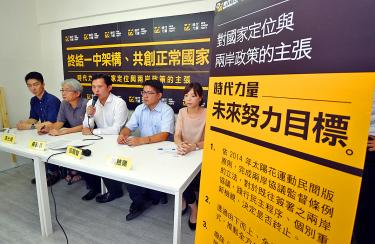The New Power Party (NPP) yesterday said its cross-strait policy would focus on demonstrating that Taiwan and China are two separate nations, while amending laws according to the cross-strait factual “status quo.”
“Chinese Nationalist Party [KMT] presidential hopeful Hung Hsiu-chu [洪秀柱] earlier proposed her ‘one China, same interpretation’ model, while President Ma Ying-jeou [馬英九] insists on ‘one China, with each side having its own interpretation,’ and KMT Chairman Eric Chu [朱立倫] said that the two sides of the Taiwan Strait both belong to ‘one China,’” NPP Acting President Huang Kuo-chang (黃國昌) told a news conference.
“Although their ideas might be slightly different, all sit under the framework of ‘one China,’ which is against the principles of national sovereignty and constitutional democracy, because Taiwan’s sovereignty belongs to the 23 million people of Taiwan, not to anyone in China,” he added.
Huang acknowledged that constitutional amendments define Taiwan as the free area of the Republic of China (ROC) and China as the mainland area of the ROC.
However, “it is clear that our sovereignty and jurisdiction do not cover the People’s Republic of China [PRC], so Taiwan and China are in a nation-to-nation relationship,” he added.
Justin Wu (吳崢), the chief executive director of NPP legislative candidate Freddy Lim’s (林昶佐) campaign office, said that the transition must begin with changing the Constitution.
“No one believes in the Constitution; it is outdated and full of defects, and is more like a fairy tale, because it denies the existence of the PRC, saying that it is the ‘mainland area’ of the ROC,” Wu said. “It is just so far from the facts.”
The 25-year-old political activist said that since birth, he and his colleagues have known their nation only as Taiwan, so China for them is just another foreign country.
Therefore, it is crucial to amend the Constitution to be in accordance with the facts, he said.
Reporters asked whether Huang would join the legislative race by running for district representation or as an at-large legislator in the Democratic Progressive Party (DPP).
Huang said that since he said last month that he would not run for the constituency in New Taipei City’s Sijhih District (汐止), he has not had any new thoughts about running.
When pressed on whether he would join the DPP as an at-large legislator, Huang said: “Impossible.”
“As an NPP member, I would maintain a competitive yet cooperative relationship with the DPP; we would strive to be the second-largest Taiwan-centric political party, with the goal to smash the KMT,” Huang said. “Therefore, it is impossible for me to join the DPP as an at-large legislator.”
The question stemmed from a call by the Taiwan Society North advocacy group urging members of all smaller pro-independence parties to join the DPP to endeavor for at-large seats.
Source: Taipei Times - 2015/07/09





















